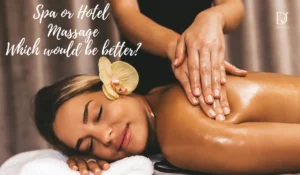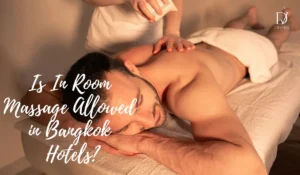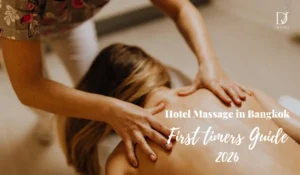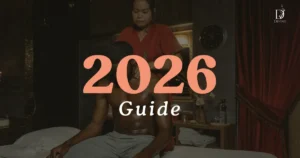Your Perfect Massage Match: English-Speaking Therapists, Pressure & Style Guide
Table of Contents
Last week I had the worst massage of my life. Not 'cause the therapist was bad—she was probably amazing—but we literally couldn't communicate AT ALL.
I kept saying "softer, please," and she kept smiling and going HARDER. By the end I felt like I'd been beaten up by a tiny Thai lady. My shoulders were destroyed. And the whole time I'm lying there thinking... how is this SO difficult???
Turns out finding the right massage therapist is exactly like dating. Chemistry matters, communication is everything, and most importantly—they need to actually listen when you tell them what you want. I've been in Bangkok 4 years now, probably had 200+ massages (yes, really), and FINALLY cracked the code.
OK, Let's Talk About the Language Thing
Nobody wants to admit this, but language barriers during massage are so awkward it's painful.
Picture this: you're lying there basically naked trying to explain that your left shoulder has this weird knot thing, but it's not sharp pain—more like... dull? And can they work on it but, like, not too hard but also not too soft, and... the therapist is just nodding and smiling while doing something completely different with your right leg.
I used to feel SO guilty wanting an English-speaking therapist. Like maybe I'm just another ignorant expat who should learn Thai (I tried, OK? I can't do tones. I sound like a drowning cat).
But then I realized—this is literally about your body. If you can't say what hurts or what feels good, what's even the point??
Divine Thai Spa therapists actually test English during hiring, which honestly changed my life. Not Shakespeare-level English, but enough for:
- Harder/softer, please
- That exact spot—yes
- My neck is sensitive—please be careful
- Skip my lower back
- I'm ticklish there (shut up—we all have spots)
Last month I had this therapist, who not only understood my sciatica rambling but suggested stretches. In English!! I wanted to hug her.
Pressure Levels—The Thing Nobody Explains Properly
Everyone acts like pressure is just "hard or soft," but that's like saying food is "hot or cold." There's a whole spectrum, and nobody tells you what anything actually means.
So after getting massages literally everywhere, here's what pressure REALLY feels like:
The problem is most places just ask, "strong or soft?" which tells you nothing. I've had "soft" massages that left bruises and "strong" ones where I felt nothing.
Styles—They're NOT All the Same Thing
It took me 2 years to figure this out... Massage styles aren't interchangeable. Asking for deep tissue when you book Traditional Thai Massage is like ordering pasta at a sushi place.
How to Actually Find Your Perfect Match
Here's exactly what I do now, and it works every time:
First, check if they have therapist profiles. Some places list specialties like "Khun Mali: deep tissue specialist, good English, won massage competition"—YES, give me her immediately.
When booking, be annoyingly specific:
- Level 6 pressure, but 4 on neck (sensitive)
- 60% focus on back, 30% on legs; skip feet (ticklish AF)
- Oil massage but add stretching if possible
- English-speaking preferred, please
Some places think I'm high maintenance. Good places appreciate it because they want you happy.
The Sukhumvit Advantage (It's Real)
If you're in Sukhumvit, you basically won the lottery for English-speaking therapists—highest concentration because of all the expats and tourists.
But even here, quality is all over the place. Same spa can have one therapist with perfect English and the next one knows "hello" and "finish." That's why being specific when booking matters so much.
Red Flags That You're About to Have a Bad Time
Weird Time-of-Day Thing
Discovered something bizarre—the therapist quality changes by time of day:
Book early = better therapists. Unfair but true.
Communication Hacks When English Fails
Even with language barriers, these work:
Phone — Google Translate sucks, but showing a body diagram with an arrow at the pain spot works.
Sounds — I know it's dumb, but "ahhh" for good and "ssss" (hissing) for too hard is universal.
Hands — thumbs up/down, pointing, bigger/smaller gestures. Everyone gets it.
5 Thai Words That Save Lives:
The Money Thing
Look, pricing usually = quality. Not always, but...
Sweet spot is 800-1200 for good English-speaking therapists who know their stuff.
What the Experts Say
American Massage Therapy Association says communication is the #1 factor for satisfaction. Not technique, not ambiance—COMMUNICATION. So wanting English-speaking isn't being difficult; it's being smart.
Chulalongkorn University found Bangkok massage tourists report 40% higher satisfaction when there's no language barrier. FORTY PERCENT!
My Setup Now
After all this trial and error, here's what works:
Online booking so I can write exactly what I want. Request English speaker who does combination massage. Level 6 generally, 4 on neck. Morning appointments when possible. When I find someone perfect, I tip well and get their Line.
Found Khun Ann last month who is PERFECT. Remembers I hate foot massage, adjusts time to other areas. Living the dream.
🎯
Finding your perfect therapist match isn't being picky—it's knowing what you want and being able to say it. English-speaking therapists aren't necessarily better at massage, but if you can actually tell them what you need, you're gonna get it.
Don't feel bad about preferences. Your body, your money, your choice.
Contact places directly to ask about English speakers. Check service areas—tourist areas = better English. Read FAQs to see if they mention language.
Perfect massage is out there. Now you know how to get it.




